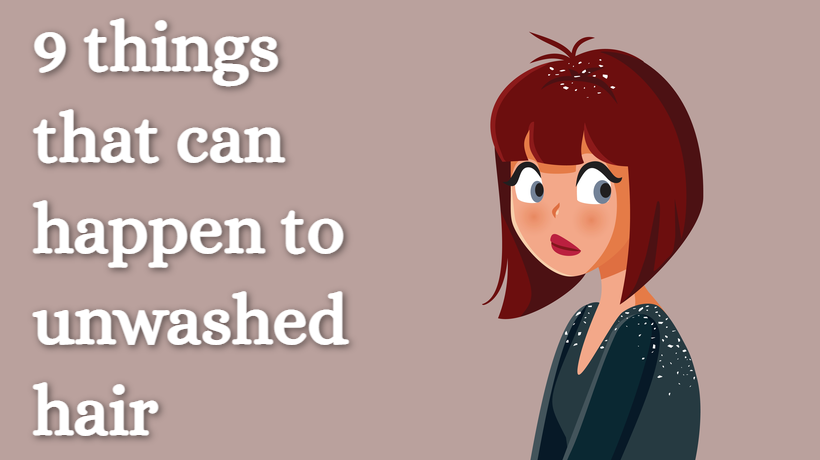Washing your hair may come with a bit more thought than you might expect. We may have different schedules when it comes to showering: we each have different regimens and different products we like to use. Depending on our hair texture and length, we may vary our washing schedules.
Most people typically go around 2 days without washing their hair, which allows the strands to moisturize themselves instead of being over-cleansed with shampoo.
“There isn’t a set standard for hair washing frequency,” said matrix Global Artistic Director Michelle O’Connor to Bustle. “It truly depends on what kinds of products you are using, your lifestyle, and how oily your hair gets on a day-to-day basis. It also depends on how long your hair retains moisture,” she added.
2 days without washing is pretty standard, but some individuals may do it daily or even once a week. If you are not entirely sure how often you should be cleaning your hair, it is best to consult with your hairdresser for their recommendation.
Many stylists advise against washing your hair daily, as it can strip your hair’s natural oils and dull the natural color. However, if you are someone who does not wash their very often, here are some possible effects you could encounter.
Thinner hair
If you happen to have thin hair, you may know the struggles of an oily scalp. Thin and fine hair accumulates oil much quicker, making the strands stick together and appear much thinner. Though it can be resolved with a touch of dry shampoo, which helps to soak up any excess oil and make the hair appear fuller, you can also consider a different hairstyle, like putting it in an up-do.
Ingrown hairs
Although they are much less visible on the scalp, ingrown hairs that result from not washing can be quite stubborn and bothersome. Oil and dirt buildup can cause ingrown hairs to become trapped in the scalp, leading to potential discomfort. “The longer you go between washes, the more dirt and oils will build up on your scalp, which can […] cause ingrown hairs — dry shampoo can also be a culprit,” Celebrity stylist Scott Yance said to Bustle.
Dust accumulation
Seeing little bits of fuzz or what appears to be dandruff can actually be dirt and debris. After not washing for a prolonged period, your hair is more susceptible to collecting debris from your surroundings, like your pillow or hat. You can always comb out these little fuzzes, or it might be time to take a shower.
Hydrated hair
A few days without washing can actually result in much more hydrated hair. If you’re one who tends to overwash, the scalp can quickly become dehydrated and dry. Natural oils from the scalp, O’Connor explained, don’t travel down curly and coily strands as efficiently and contribute to its dry nature.
“The goal here [with not shampooing every day] is to preserve moisture, and therefore, spreading out your wash days helps to maintain moisture levels,” O’Connor said
Hair odor
After a while of not washing your hair, you may not smell the fragrances of your shampoo and conditioner anymore. An oily, musty smell may come with your hair after not washing it after a while. Try adding a touch of dry shampoo, which can freshen up your scalp and get rid of that smell temporarily.
Smoother hair
After a few days of washing your hair, the natural oils can actually give you that perfect level of oil for smooth hair. George Gonzales, owner of George the Salon based in Chicago actually suggested to “try to rinse your second day and only condition.” Another great alternative to shampoo is a ‘cleansing conditioner’ which not only removes dirt and buildup, but it simultaneously conditions the hair.
Dandruff buildup
Many experts argue that dandruff is not solely caused by a dry scalp, but can be caused by an oily one as well. Going a few days without washing your hair can actually worsen the dandruff, especially if you skip conditioner as you are not giving your hair the moisture it needs.
Hair fallout
In the worst case scenarios, your hair can begin to fall out. If not careful, an overuse of products without properly washing them out can lead to an unhealthy buildup on the scalp. “A congested scalp will […] bring on loss of hair,” said Jenna Mast, a NYC-based stylist. Make sure to always properly cleanse your hair regularly to prevent excess hair loss, especially if you use a lot of products to style your hair on a daily basis.
Change in Texture for Dyed Hair
If you are someone who is accustomed to hair dye, you may know that it can possibly change your hair texture in the beginning, usually making it much harder than it used to be. The natural oils from your scalp can condition your hair, regardless if it is colored or not.



